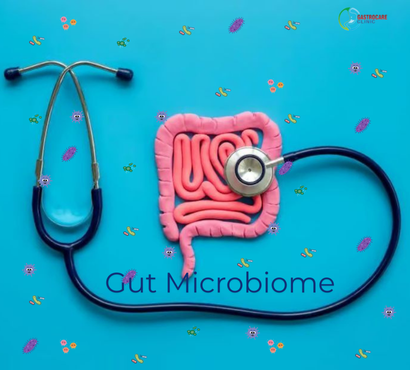The human body is home to trillions of microorganisms, collectively known as the microbiome. The gut microbiome, specifically, refers to the complex ecosystem of bacteria, fungi, viruses, and other microbes residing in our digestive system. These tiny organisms play an essential role in our overall health, affecting digestion, immunity, mental health, and more.
In this blog, we’ll explore what the gut microbiome is, why it matters, and how you can support it for optimal health.
What is the Gut Microbiome?
The gut microbiome is a diverse community of microorganisms living in the gastrointestinal (GI) tract, primarily in the intestines. Comprising both beneficial and harmful microbes, this ecosystem operates in a delicate balance. When in harmony, the gut microbiome supports critical bodily functions, but when disrupted, it can contribute to various health issues.
Key Components of the Gut Microbiome
- Beneficial Bacteria: Lactobacillus and Bifidobacterium promote digestion and nutrient absorption.
- Pathogenic Microbes: Harmful bacteria and viruses, which, when overgrown, can lead to disease.
- Fungi and Yeast: Play a role in digestion but can cause problems when overgrown, like Candida infections.
- Archaea and Viruses: Less studied but believed to contribute to gut diversity.
The Importance of the Gut Microbiome
1. Digestive Health
The gut microbiome aids in breaking down food, particularly complex carbohydrates and fiber, which human enzymes cannot digest alone. Beneficial bacteria produce short-chain fatty acids (SCFAs), essential for colon health.
2. Immune System Support
About 70% of the immune system resides in the gut. A balanced microbiome helps regulate immune responses, preventing autoimmune diseases and infections.
3. Mental Health and Mood
The gut-brain axis is a two-way communication system linking the gut and brain. Gut bacteria produce neurotransmitters like serotonin, influencing mood, stress levels, and mental health.
4. Weight Management
A healthy microbiome supports metabolism and energy regulation, reducing the risk of obesity and metabolic disorders.
5. Chronic Disease Prevention
Imbalances in gut bacteria, known as dysbiosis, are linked to conditions like diabetes, cardiovascular disease, and inflammatory bowel disease (IBD).
Factors Affecting the Gut Microbiome
The gut microbiome is influenced by various internal and external factors:
- Diet: High-fiber, probiotic-rich diets support gut health, while processed foods and sugars disrupt it.
- Antibiotics: While necessary at times, antibiotics kill both harmful and beneficial bacteria, disturbing microbiome balance.
- Stress: Chronic stress impacts gut health through the gut-brain connection.
- Sleep: Poor sleep quality disrupts gut microbial diversity.
- Age: The microbiome evolves with age, starting from birth and stabilizing in adulthood.
How to Support a Healthy Gut Microbiome
1. Eat a Diverse Diet
A varied diet with plenty of fruits, vegetables, whole grains, and legumes promotes microbial diversity, key for gut health.
2. Incorporate Probiotics and Prebiotics
- Probiotics: Found in yogurt, kefir, sauerkraut, and kimchi, probiotics introduce beneficial bacteria into the gut.
- Prebiotics: Foods like bananas, garlic, and onions act as food for probiotics, encouraging their growth.
3. Limit Processed Foods and Sugars
Refined carbs and sugars feed harmful bacteria, promoting dysbiosis. Replace these with whole, nutrient-rich foods.
4. Stay Hydrated
Water supports digestion and promotes the health of the gut lining, a crucial barrier against harmful microbes.
5. Manage Stress
Practice mindfulness, yoga, or deep breathing exercises to reduce stress and its impact on gut health.
6. Exercise Regularly
Physical activity promotes a diverse microbiome and supports gut motility, preventing constipation.
7. Avoid Unnecessary Antibiotics
Use antibiotics only when prescribed and follow up with a probiotic-rich diet to restore gut bacteria.
Common Signs of an Unhealthy Gut Microbiome
- Frequent bloating, gas, or indigestion
- Persistent fatigue or low energy
- Skin issues like eczema or acne
- Recurring infections or weakened immunity
- Mental health issues such as anxiety or depression
If you notice these symptoms, it might be worth consulting a healthcare professional for a gut health evaluation.
Gut Microbiome and Indian Diet
India’s diverse culinary traditions offer a natural advantage for gut health. Dishes like idli, dosa, and fermented pickles are rich in probiotics, while lentils, beans, and spices like turmeric provide prebiotic fiber and anti-inflammatory benefits.
Indian Foods That Promote Gut Health
- Curd (Dahi): A staple probiotic food in Indian households.
- Idli and Dosa: Fermented rice and lentil pancakes loaded with beneficial bacteria.
- Pickles: Naturally fermented pickles (without vinegar) offer probiotics.
- Turmeric: Known for its anti-inflammatory and gut-healing properties.
Foods to Avoid
- Deep-fried snacks like samosas and pakoras.
- Excessive sweets and sugary drinks like sodas.
The gut microbiome is integral to overall health, influencing digestion, immunity, mental well-being, and more. By adopting a gut-friendly diet and lifestyle, you can nurture your microbiome and enjoy better health and vitality. With simple changes like adding probiotics, managing stress, and eating a diverse diet, you can support a balanced microbiome and reap its long-term benefits.
Investing in your gut health today is an investment in your overall well-being for the future.
FAQs
Q1: How long does it take to improve gut health?
A: With the right diet and lifestyle changes, gut health can improve in as little as two weeks, though long-term habits are essential for sustained benefits.
Q2: Are all probiotics the same?
A: No, different strains of probiotics have unique benefits. Consult a healthcare provider for specific recommendations based on your health needs.
Q3: Can poor gut health affect my mood?
A: Yes, the gut-brain connection means imbalances in gut bacteria can influence mood, anxiety, and even depression.

